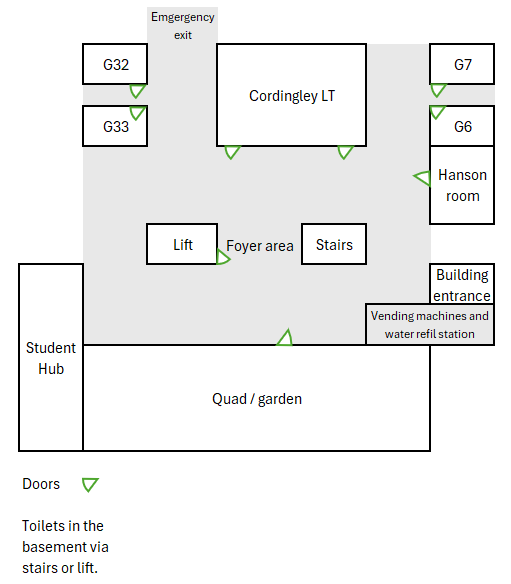Time
Title
Speaker
Location
Click blue buttons for abstract info.
Wednesday 11th September
12:00
Registration & coffee
Foyer
12:45
Welcome, Prof Chris Taylor, Assoc. Vice President for Digital Strategy and Innovation,
UoM
Cordingley
13:00
Keynote 1
Earth-2: Building blocks for Digital Twins of Environmental Systems
Christoph Angerer (Nvidia)
Cordingley
13:40
Considering a large-scale investment for environmental data science: EDR-UK
Cordingley
14:00
Short break
Time
Title
Speaker
Location
Time
Workshop
14:05
Talk 1
Jenna Lawson, UK CEH
Cordingley 14:05
Talk 4
Katharine Willis, University of Plymouth
G32 14:05 - 15:05
Workshop 1
What if.....? An exploration of the possibilities that could be leveraged through the
digitisation of NERC’s science collections, BGS.
G33
14:25
Talk 2
Phil James, Newcastle University
Cordingley 14:25
Talk 5
Jaana Pinnick, British Geological Survey
G32
14:45
Talk 3
Louise Darroch, National Oceanography Centre
Cordingley 14:45
Talk 6
James Ayliffe, British Oceanographic Data Centre, National Oceanography Centre
G32
15:05
Coffee & networking
Foyer
15:20
Talk 7
Dan Condon, British Geological Survey
Cordingley 15:20 - 16:20
Workshop 2
Chatting to the park: the Nature Data toolkit, EU Green Minds / University of Plymouth.
G32
15:20 - 16:20
Workshop 3
Transforming environmental science with Digital Twins, NERC-MetOffice.
G33
15:40
Talk 8
Tim Bellerby, School of Environmental Sciences, University of Hull
Cordingley
16:00
Talk 9
Haofan Wang, Sun Yat-sen University
Cordingley
16:20
Short break
Foyer
16:30
Keynote 2
Our Environmental Digital Twin
Adam Branscomb, Esri UK
Cordingley
17:10
Poster introductions
Cordingley
17:30
Drinks reception, networking & poster viewing
Foyer
Thursday 12th September
08:30
Registration & coffee
Foyer
09:00
Talk 10
Alexander Osborne, University of Hull
Cordingley
09:20
Talk 11
Zhonghua Zheng, The University of Manchester
Cordingley
09:40
Talk 12
Yang Cao, Nanjing University & The University of Manchester
Cordingley 09:30 - 10:30
Workshop 4
A User Focused Approach to Data Submissions, BODC - NOC.
G32
09:30 - 10:30
Workshop 5
Developments in environmental research sensor data management, UKCEH
G33
10:00
Lightning Talk 1
Luigi Cao Pinna, University of Glasgow
Cordingley
10:15
Lightning Talk 2
Lewis Sampson, DAFNI, STFC SCD
Cordingley
10:30
Coffee, networking & poster viewing
Foyer
11:00
Keynote 3
AI and machine learning for the environment
Nour Shaker, Microsoft
Cordingley
12:00
Lunch, networking & poster viewing
Foyer
Time
Title
Speaker
Location
Time
Title
Speaker
Location
Workshops
13:00
Lightning talk 3
Thomas Mansfield, Plymouth Marine Laboratory
Cordingley 13:00
Lightning talk 8
Simon O'Meara, NCAS & University of Manchester
G32 13:00
Lightning talk 13
Shona Ferguson, UK Centre for Ecology and Hydrology
G33 13:00 - 14:00
Workshop 6
The NERC Digital Solutions Hub use case demos, UoM
G7
13:15
Lightning talk 4
Kwok Pan Chun, University of the West of England
Cordingley 13:15
Lightning talk 9
Maddalena Tigli, UKCEH
G32 13:15
Lightning talk 14
Poppy Townsend, Environmental Data Service (CEDA)
G33
13:30
Lightning talk 5
Simon Rolph, UK Centre for Ecology & Hydrology
Cordingley 13:30
Lightning talk 10
Ionut Alexandru Paun, University of Glasgow
G32 13:30
Lightning talk 15
Patrick Bell, British Geological Survey
G33
13:45
Lightning talk 6
Colin Sauze, National Oceanography Centre
Cordingley 13:45
Lightning talk 11
Mojtaba Masoudi, National Oceanography Centre
G32 13:45
Lightning talk 16
Junjie Yu, The University of Manchester
G33
14:00
Lightning talk 7
Aude Vuilliomenet, UCL
Cordingley 14:00
Lightning talk 12
Fei Jiang, The University of Manchester
G32 14:00
Lightning talk 17
Jiyang Xia, The University of Manchester
G33
14:15
Coffee & networking
Foyer
14:45
NERC digital Q & A - what next for environmental research in an ever evolving
digital environment? This closing session offers participants the opportunity to discuss ideas for
initiatives such as ERDUK and the future of the digital gathering. Cordingley
15:30
Close & DG25
Cordingley
15:45
End
